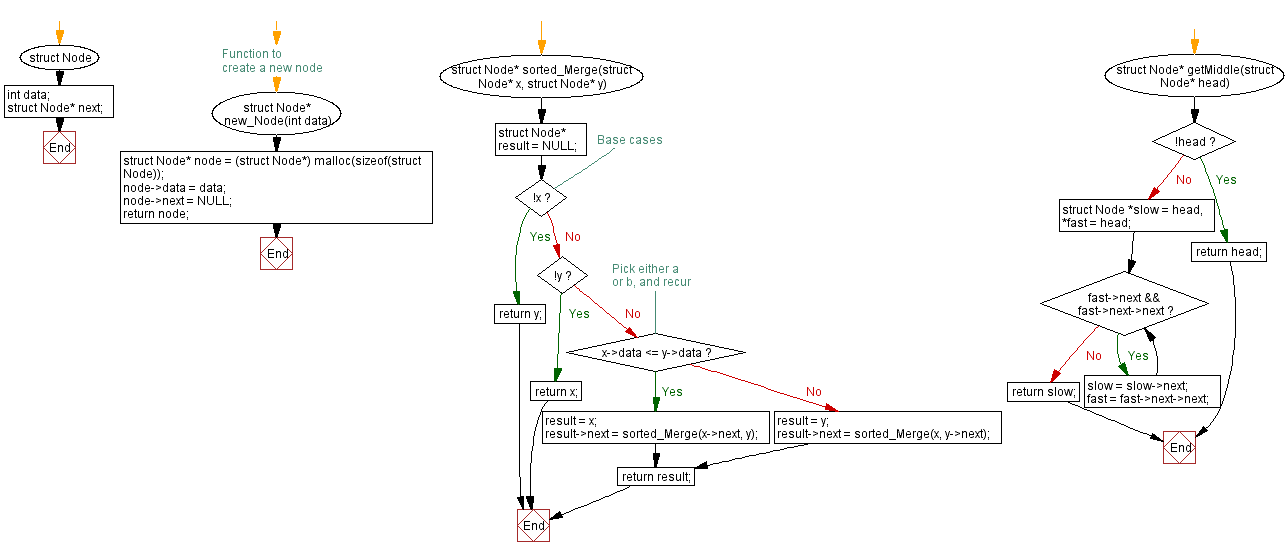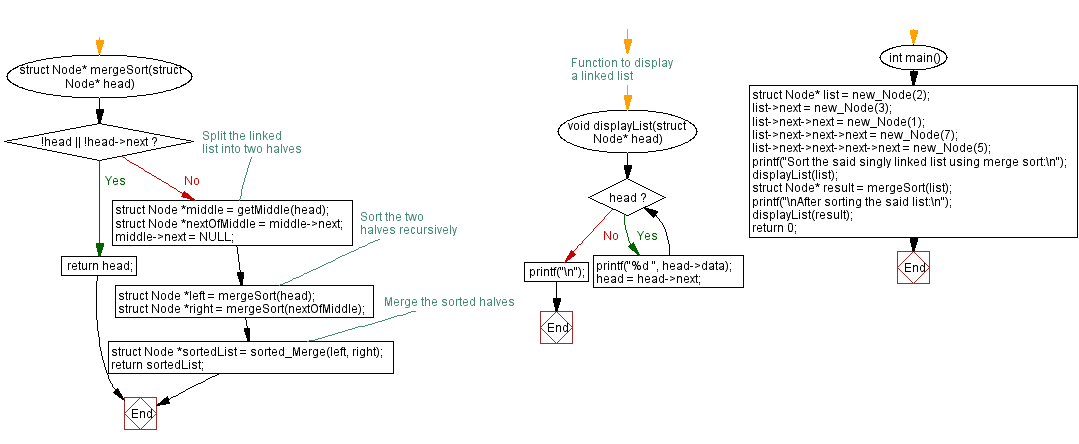C Exercises: Sort a singly linked list using merge sort
17. Linked List Sorting Challenges
Write a C program to sort a singly linked list using merge sort.
Sample Solution:
C Code:
#include<stdio.h>
#include <stdlib.h>
// Define a structure for a Node in a singly linked list
struct Node {
int data;
struct Node* next;
};
// Function to create a new node with given data
struct Node* new_Node(int data) {
// Allocate memory for a new node
struct Node* node = (struct Node*) malloc(sizeof(struct Node));
// Set the data for the new node
node->data = data;
// Set the next pointer of the new node to NULL
node->next = NULL;
return node;
}
// Function to merge two sorted linked lists
struct Node* sorted_Merge(struct Node* x, struct Node* y) {
struct Node* result = NULL;
// Base cases for recursion
if (!x)
return y;
if (!y)
return x;
// Pick either node from x or y, and continue merging
if (x->data <= y->data) {
result = x;
result->next = sorted_Merge(x->next, y);
} else {
result = y;
result->next = sorted_Merge(x, y->next);
}
return result;
}
// Function to find the middle of a linked list
struct Node* getMiddle(struct Node* head) {
if (!head)
return head;
struct Node *slow = head, *fast = head;
// Use slow and fast pointers to find the middle node
while (fast->next && fast->next->next) {
slow = slow->next;
fast = fast->next->next;
}
return slow;
}
// Function implementing the merge sort algorithm for linked list
struct Node* mergeSort(struct Node* head) {
if (!head || !head->next)
return head;
// Split the linked list into two halves
struct Node *middle = getMiddle(head);
struct Node *nextOfMiddle = middle->next;
middle->next = NULL;
// Recursively sort the two halves
struct Node *left = mergeSort(head);
struct Node *right = mergeSort(nextOfMiddle);
// Merge the sorted halves
struct Node *sortedList = sorted_Merge(left, right);
return sortedList;
}
// Function to display the elements of a linked list
void displayList(struct Node* head) {
// Traverse the list and print each element
while (head) {
printf("%d ", head->data);
head = head->next;
}
printf("\n");
}
// Main function where the execution starts
int main() {
// Create a singly linked list
struct Node* list = new_Node(2);
list->next = new_Node(3);
list->next->next = new_Node(1);
list->next->next->next = new_Node(7);
list->next->next->next->next = new_Node(5);
printf("Sort the said singly linked list using merge sort:\n");
displayList(list); // Display the original list
// Perform merge sort on the list
struct Node* result = mergeSort(list);
printf("\nAfter sorting the said list:\n");
displayList(result); // Display the sorted list
return 0; // Indicates successful completion of the program
}
Sample Output:
Sort the said singly linked list using merge sort: 2 3 1 7 5 After sorting the said list: 1 2 3 5 7
Flowchart :


For more Practice: Solve these Related Problems:
- Write a C program to sort a singly linked list using the quick sort algorithm.
- Write a C program to sort a linked list using recursive insertion sort.
- Write a C program to sort a singly linked list based on a custom comparator function provided by the user.
- Write a C program to sort a linked list by swapping the data fields of nodes instead of rearranging pointers.
Go to:
PREV : Duplicate Removal Challenges.
NEXT : Copy with Random Pointers Challenges.
C Programming Code Editor:
Have another way to solve this solution? Contribute your code (and comments) through Disqus.
What is the difficulty level of this exercise?
